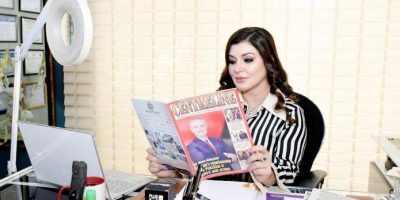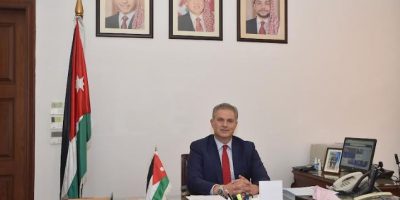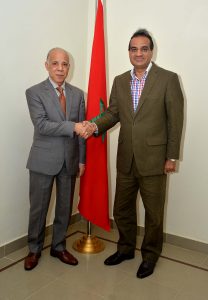Mohammed Karmoune: Morocco, Pakistan ties strong, cordial

Ambassador of Morocco talks to Centreline
Ansar Mahmood Bhatti
Ambassador of Morocco H.E. Mr. Mohammed Karmoune talked to Centreline. Ambassador Karmoune discussed various issues relating to bilateral relations between Pakistan and Morocco and trade and investments opportunities in Morocco. The ambassador also talked about constitutional reforms in his country. Here is the text of his interview.
Please share with our readers brief history of the celebration of the day?
It is a very distinctive day for Morocco and its whole nation, from the city of Tangiers in the North Western part to Lagouira in the southern provincesof the Kingdom;it is one of the most celebrated days of the year. It’s the 18th anniversary of His Majesty King Mohammed VI (sixth) enthronement. I would like to give an overview of the Moroccan political system then to reveal some highlight events of the Moroccan diplomacy and finally to present some facts on the economical field.
Morocco is a constitutional monarchy, and the King is the dominant political figure, with a dual role as temporal leader and “Commander of the Faithful” (Amir Al‑Muminine). The king oversees policy and heads the armed forces and since His Accession to the Throne on July 30,1999, His Majesty the king has initiated and still an unprecedented process of reforms in political, religious, economic, social and cultural fields to ensure the wellbeing of the Moroccan people and guide the nation towards progress and prosperity. The action taken by the sovereign, since then, is part of the sustainability and continuity of the Moroccan political system since its first creation over 12 centuries ago.
On ascending the throne, the king pledged himself to the principles of constitutional monarchy, the rule of law, a multiparty system, improved rights for women and respect for human rights and individual liberties, He has dared to do a methodical meditation on the sharing of the economic surplus: eighteen years that the vision has built the prototype of the new economic Morocco; the panorama of this new model is already traced today, took shape and reached a certain maturity level
The July 2011 referendum has set out constitutional reforms in favor of a separation of powers. Thusthe Head of government, (Prime Minister), according to the dispositions of the new constitution adopted hasto be selected from the party that gets the large number of seats in the House of Representatives; besides that thepowers endorsed to him, have been strengthened slightly.
As we know Morocco has also been playing key role in foreign affairs. Please share with us some details of Moroccan foreign policy?
It should be underlined that the most significant development in Moroccan diplomacy is the return of the country to the continental organization, the African Union after a 33-year of absence, despite stiff resistance from some member states. This event was materialized during the 28th annual summit of the African Union held over two days,(30 to 31 January 2017),in Addis Ababa, the Ethiopian capital, 54 heads of states voted on the reintegration of Morocco within the Union. In theory, the accession of Morocco was only a matter of formality in so far as it had already. After an emotional and tense debate, member states decided to welcome the coming back of Morocco to itsAfrican “family”.
In the same way to draw strongly its African diplomacy, Morocco decided also to present its membership to the West African regional group Ecowas. This step came after it rejoined the African Union in January 2017. Despite the country being in North Africa, West African regional group Ecowas has in principle approved the said initiative. Morocco, along with Tunisia which is seeking observer status within the organization and Mauritania, which wants to return to the body, will be invited to the next meeting of heads of states in Togo in December 2017.
Ecowas is made up of 15 West African nations, none of which shares a border with Morocco. However Morocco has developed recently an ambitious strategy on investment and commercial levels in several African countries. And all these actions get right to the goals of Ecowas which has engraved in its statutes the importance of free trade and movement of people.
Another important fact that marked Moroccan diplomacy at the end of 2016 was the holding of COP22 in Marrakech; in hosting this international event, (November 7-18), Morocco aspired that the Conference of the Parties should be action-oriented. As the first COP to be convened after the Paris Agreement, COP22 has been a litmus test for climate diplomacy. Indeed, the contributions of the countries party to the UN Framework Convention on Climate Change have not been sufficient enough to enable us to achieve that goal.
Therefore, most of the participants felt major necessity, urgently to adopt sustainable development approaches and innovative technological strategies and make sure they will be implemented rapidly. Before to go on, let me underline that our first Moroccan Ambassador to the actual Pakistan is Ibn Batouta who was an outstanding Moroccan traveler and discoverer of medieval period, who had visited the ancient Sindh when he reached on the right bank of river “PanjAeb” (River Indus) onSeptember 12, 1333 where he made a brief stay there and visited various cities and places in the Multan province (present-day Sindh and south Punjab).
Pakistan and Morocco enjoy excellent relations. Can you highlight some salient features of this relationship?
Since their establishment in the 1950s Morocco, Pakistan relations have traditionally been strong and cordial, soon after Pakistan’s independence from the United Kingdom, Morocco maintains an embassy in Islamabad, (1958), whereas Pakistan maintains its diplomatic representation in the capital, Rabat. Both countries have co-operated significantly since the past and continue to widely expand their relations.
Morocco and Pakistan have always enjoyed close, cordial and fraternal relations, which are deeply rooted in their common Islamic heritage. Over the years, the excellent bilateral relations between Pakistan and Morocco have been strengthened and reinforced. These relations are characterized by a similarity of views and a shared perception on major global and regional issues. They have always coordinated their actions in different international forum and mainly on the level of the Organization of the Islamic Cooperation, where they are very active members.
Nevertheless, I believe that trade is the key element to emphasize on to bring our two brotherly countries, strengthen relations between our two peoples and our two nations, having in mind that the political bilateral relations are in a very outstanding and exceptional level. I would like at the same time to applaud, the signature of the memorandum of good understanding signed the month of March of this year, jointly between the federation of the chamber of commerce and industry of the Islamic Republic of Pakistan and its counterpart of the Kingdom of Morocco.
If you could share some details about Moroccan
Population size and the agriculture sector?
The results of the general census of population and housing in 2014 indicates that the size of the legal population of the kingdom reached on 1 September 2014, the number of 33,848,242, precisely 33,762,036 Moroccans and 86,206 foreigners.
Morocco is primarily an agricultural country, boasting fertile land and a variety of agricultural products; with consequent rainfall.
The agricultural sector contributes with 19% to the national GDP, divided between agriculture (15%) and agro-industry (4%). This sector employs over 4 million people including about 100,000 in agro-industry.
The new agricultural strategy, Green Morocco Plan, established by the Ministry of Agriculture and fisheries, aims to consolidate the success achieved and to meet new challenges facing Morocco’s competitiveness and opening of markets.
Morocco possesses huge exptertise in renewable energy. Please
share with our readers some details?
As part of its strategy towards energy use, Morocco gives priority to developing renewable energy and sustainable development. (Exp. Noor-Ouarzazate solar plant), launched in February 2016. With abundant solar resources and a strategic position at the heart of an energy hub (Connexion with Spanish Network through two electric lines, Morocco offers a wide range of investment opportunities in the sector of thermal and photovoltaic solar energy.
Beside solar energy, Morocco has also undertaken a vast wind energy program, to support the development of renewable energy and energy efficiency in the country. The Moroccan Integrated Wind Energy Project, spanning over a period of 10 years with a total investment estimated at 31.5 billion dirhams, will enable the country to bring the installed capacity, from wind energy, from 280 MW in 2010 to 2000 MW in 2020.
As we know tourism industry contributes greatly to Moroccan economy. Please share some features besides shedding some light on Moroccan foreign trade?
Morocco is a tourist destination that has many strengths and clear potential that allowed it to become a highly popular tourist destination. With varied and contrasting landscapes (3500 km of coastline, mountains, deserts …), a rich cultural heritage (imperial cities, old towns, food and crafts), Morocco is a unique and diverse touristic experience.
Foreign trade: In addition to key phosphate exports, Morocco is developing a higher value-added manufacturing export industry, focusing on automotive, aeronautics and electrical components.
The Moroccan Investment Development Agency is the national body in charge of promoting and developing investment in Morocco. It was created in 2009.
Invest in Morocco is taking actions to promote communication and to publicize investment opportunities in Morocco and attract potential prospects. It organizes seminars, conferences, workshops, etc.., for the sake of promoting domestic and foreign investment.
Invest in Morocco also aims to analyze, monitor and periodically publish the performance indicators related to investments, and to propose to government legislation and regulations that could support and encourage investment in the Kingdom.
Invest in Morocco also provides a professional and free public service to all investors. It also offers them a wide range of services in order to set up their business in Morocco through a professional team.
Related News

DR SHUMAILA KHAN: An Aesthetic Physician par excellence
Mudassar Raja INTRODUCTION: Dr. Shumaila Khan is a well-known & energetic Aesthetic Physician, best InjectorRead More

Dr. Maen KHREASAT: Jordan’s relationship with Pakistan is historic and strong
Interview of Dr. Maen KHREASAT Ambassador of the Hashemite Kingdom of Jordan to Pakistan AnsarRead More



Comments are Closed